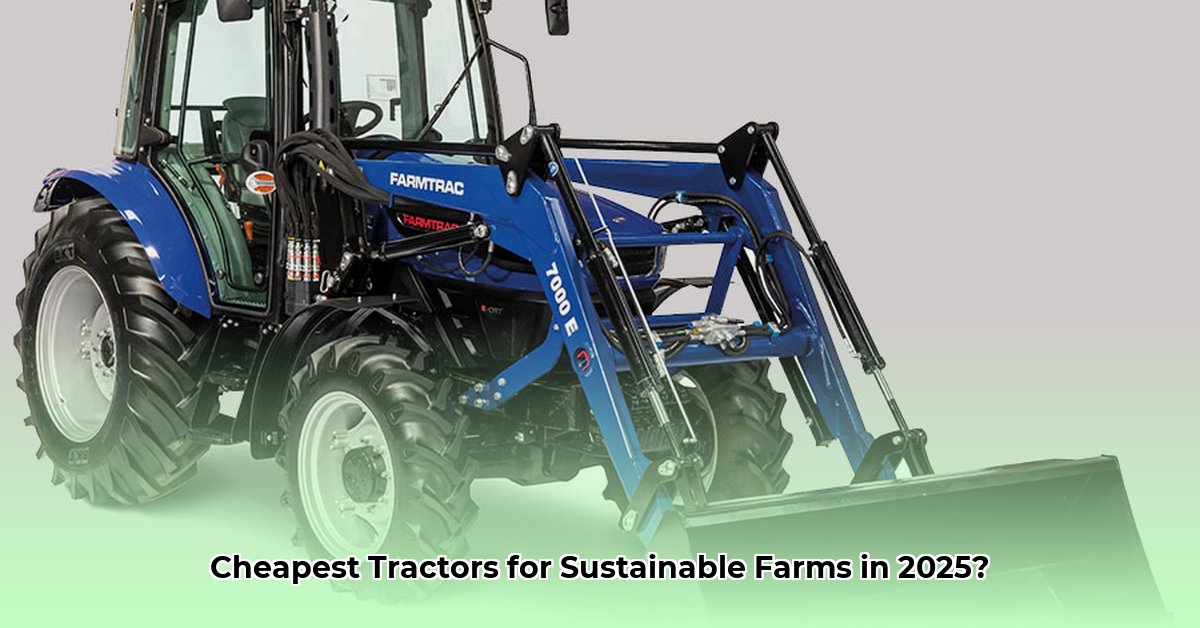
Finding the right tractor for your sustainable farm shouldn't break the bank. This guide helps you navigate the world of affordable tractors, ensuring you make a smart, informed decision in 2025. We'll go beyond simply listing brands, providing actionable steps for finding the best tractor for your needs and budget. For more reviews and comparisons, check out these tractor reviews.
Understanding Your Farm's Needs: Laying the Groundwork
Before browsing brands, assess your farm's unique requirements. This decision is as vital as choosing the right seeds for your crops. Consider these key factors:
- Acreage: How much land needs tilling? A small tractor suffices for a few acres, while larger farms require more powerful machines.
- Crops & Livestock: What are you growing or raising? Different tasks demand specific tractor capabilities and attachments. For example, hauling hay requires a strong loader.
- Terrain: Is your land flat, gently rolling or steeply hilly? Hilly terrain demands a four-wheel drive for safety and efficiency.
- Horsepower: This determines your tractor's power to handle heavy loads or tough conditions. Higher horsepower generally means a higher price, but better performance. Research the horsepower needed for your tasks.
- Attachments: Will you need a loader, tiller, mower, or other tools? These add to the overall cost, so factor them into your budget upfront.
Tractor Types and Sizes: Matching Your Needs to the Machine
Tractors come in various sizes, each with its strengths:
- Sub-compact Tractors: Best for small plots (under 10 acres), they are nimble, affordable, and easy to maneuver.
- Compact Tractors: Suitable for 10-20 acres, balancing power and maneuverability. They’re versatile for various farming tasks. Examples include the Kubota BX series and John Deere 1025R.
- Utility Tractors: Workhorses for larger properties and demanding tasks. They provide more power and capability than compact tractors. The Mahindra eMax series is frequently cited as a budget-friendly option in this category.
Remember: more horsepower usually equates to a higher price. Carefully weigh your needs against your budget.
Exploring Tractor Brands: Navigating the Marketplace
Several manufacturers offer reliable and relatively affordable tractors. However, the "cheapest" brand depends on your specific needs and location. Prices vary based on dealer location, model year, features, and deals. Popular brands include:
- Mahindra: Known for offering value and diverse models.
- Kubota: Renowned for reliability and a strong reputation, but prices can be higher than some competitors.
- TAFE: A prominent brand, particularly internationally, providing tractors ranging in size.
- LS Tractor: A competitive brand balancing features and price.
- Branson Tractors: Offers a good value proposition.
- John Deere & Massey Ferguson: While not always the cheapest, they often have affordable used models available.
Important Note: Contact local dealerships for the most up-to-date pricing and available models. Online comparisons are a starting point, not the final word.
New vs. Used Tractors: A Calculated Risk
Used tractors significantly lower the initial investment, but carry more risk. A pre-purchase inspection by a qualified mechanic is crucial to avoid costly repairs.
Pros of Used Tractors:
- Lower Initial Cost: Saves money for other farm investments.
- Functionality: Many used tractors are in excellent condition.
Cons of Used Tractors:
- Hidden Problems: Mechanical issues might arise, leading to unexpected repair costs.
- Limited Warranty: Used equipment generally has less or no warranty coverage.
Financing and Assistance Programs: Opening Doors to Ownership
Buying a tractor is a substantial investment. Explore these options:
- Farm Loans: Banks and credit unions often offer financing for agricultural equipment.
- Government Grants & Subsidies: Research local and federal programs offering financial assistance to farmers. These are often targeted to support sustainable farming practices.
- Dealer Financing: Some dealers offer their own financing plans.
Maintenance & Long-Term Costs: Planning for the Future
The purchase price is only part of the equation. Consider ongoing costs:
- Fuel: Estimate your fuel consumption based on your anticipated usage.
- Routine Maintenance: Regular servicing prevents costly breakdowns and extends the tractor's lifespan. This also impacts your total cost of ownership.
- Repairs: Budget for unforeseen repairs, even with preventative maintenance.
Conclusion: Making an Informed Decision
Choosing the "cheapest" tractor requires careful consideration of your needs, available options, and long-term costs. By carefully weighing the factors outlined in this guide and exploring available financing options, you can find a tractor that supports your sustainable farm's success for years to come. Remember to consult with local experts and thoroughly research available programs to support your agricultural endeavors.